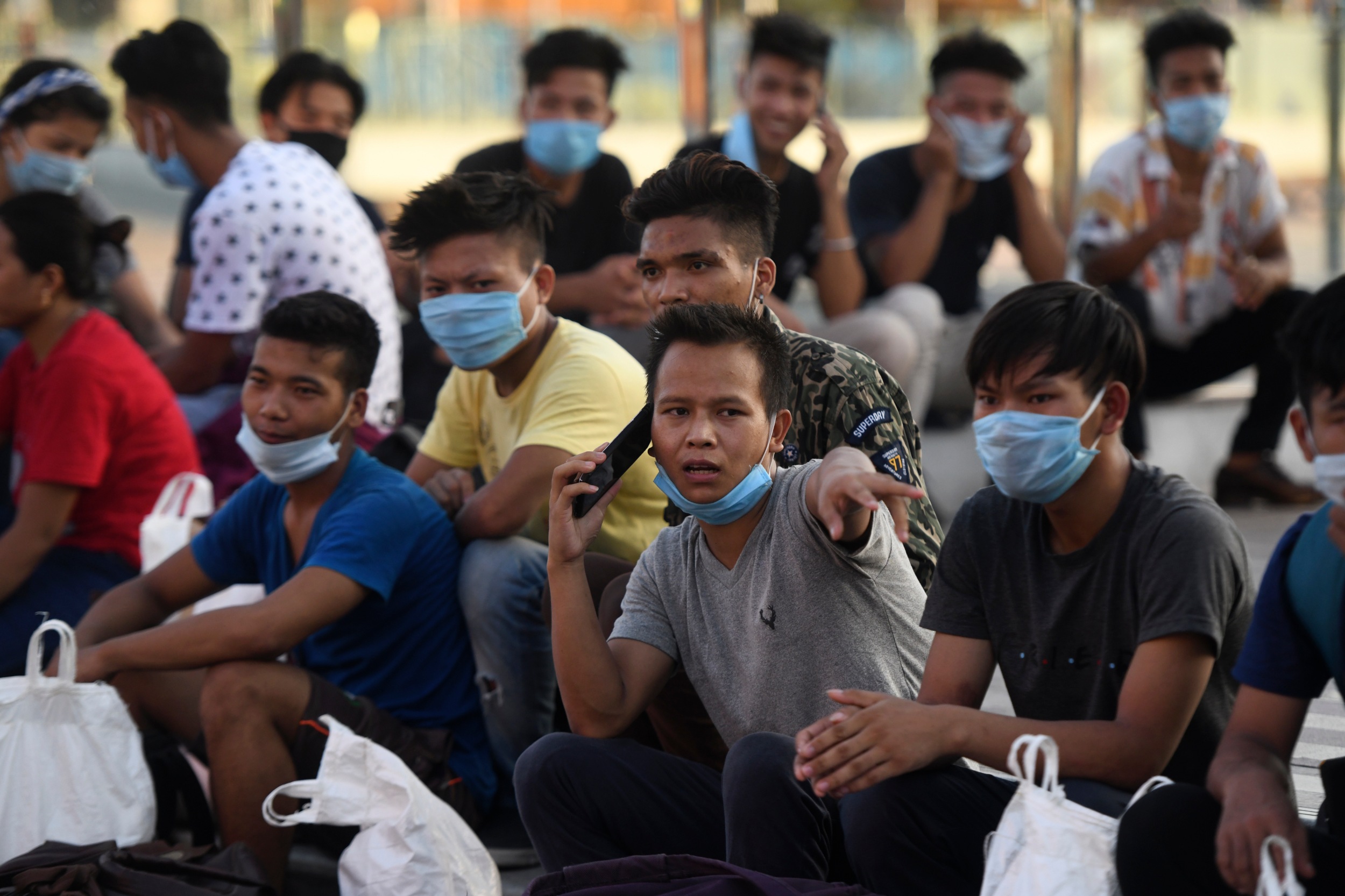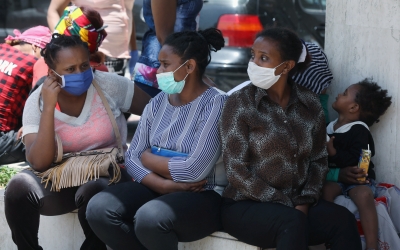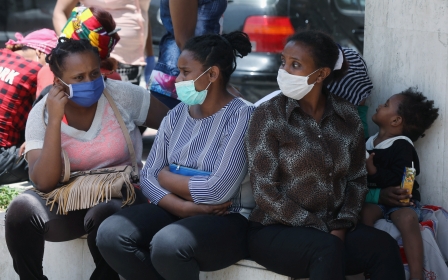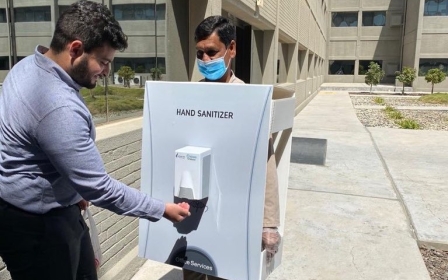Coronavirus in the UAE: Migrant workers from northeast India desperate to get home
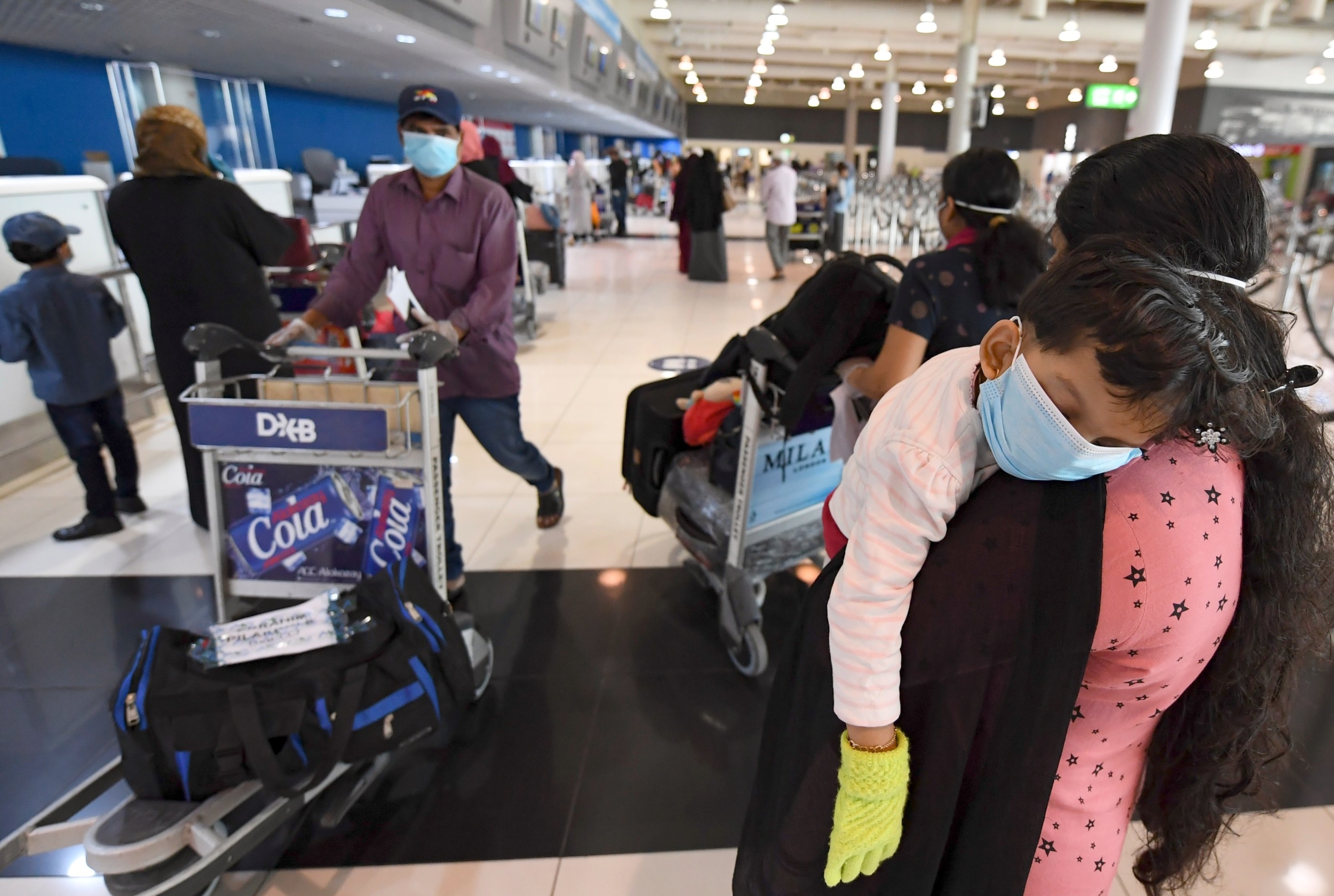
In March, Lunkhel was supposed to start work as a full-time member of the kitchen staff at a luxury hotel in Dubai. The 32-year old from the northeastern Indian state of Manipur had completed six months of training for the job. He felt, finally, that he was going to pursue his "calling".
Then the coronavirus pandemic happened.
Lunkhel told Middle East Eye that despite initial promises, his contract was not extended and the company offered to pay for his repatriation flight. Two months later, he is now home in New Delhi with his wife and two children.
Lunkhel is still one of the luckier ones, as hundreds of migrant workers from India’s northeast await their golden ticket home from the UAE.
In April, Emirati authorities announced a complete lockdown of the country to stem the spread of the coronavirus, including closing restaurants, cafes and malls. Migrant workers across the Middle East have been adversely affected by the lockdowns and ensuing economic crises due to the pandemic - and northeast Indians are no exception.
A growing part of the workforce in the service and hospitality industries in the UAE, natives of that region of India say they have been left in the lurch by both Emirati employers and their home country.
A growing northeastern expatriate population
Connected to the rest of the country through a "chicken neck" land strip 22km wide known as the Siliguri corridor, India’s northeast is often perceived as separate from its "mainland".
Natives of this little-known part of India - composed of eight states and surrounded by Nepal, China, Bhutan, Myanmar and Bangladesh - bear facial features more reminiscent of southeast and east Asians, often leading to them being singled out and discriminated against. In the wake of the Covid-19 outbreak, several instances have been reported of northeasterners being called "coronavirus", spat on and driven out by landlords in India.
Since 1954, the region has experienced bouts of homegrown insurgency by separatist factions and military operations following the partition of India and Pakistan by the British Empire in 1947.
Due to a lack of meaningful private infrastructure and limited civil service jobs, hundreds of thousands of northeastern Indians have moved both to the cities in India's mainland and abroad in search of work.
For anthropologist and University of Melbourne professor Dolly Kikon, a native of the northeastern state of Nagaland, incidents of casual and violent racism in major Indian cities have compelled a number of residents of the region to move abroad.
“Our exposure to the Indian mainland has been quite bitter and very few of us can say that it has been an exhilarating (experience),” she told MEE. “As though state violence and militarisation weren’t enough, living in Indian cities has been another layer of humiliation.”
Increasingly in the last decade, booming cities in the Gulf and southeast Asia have emerged as their preferred work destinations, with Delhi and Mumbai now becoming mere stop-gaps on the way.
Connected to the rest of the country through a 'chicken neck' land strip 22km wide known as the Siliguri corridor, India’s northeast is often perceived as separate from its 'mainland'
Emigration clearances data from the last five years show a steady flow of blue collar workers from northeastern Indian states emigrating to the UAE. However, emigration clearance is only mandatory for those who do not have a matriculation certificate, meaning these statistics do not include migrant workers with a certain degree of education, many of whom end up working in the service industry abroad.
Mezhiengunuo Sere, originally from Nagaland, says higher remittances play a large role in convincing workers like herself and her husband to take a gamble on an expensive city like Dubai.
“The cost of living is so high that we don’t end up saving much, but at least we can send more money back home,” she told MEE. Sere added that her basic salary working for a hotel in the UAE before the pandemic was twice what she used to earn when she worked for several years in Indian cities like Mumbai or Goa.
India is the country with the highest outward remittances received from the UAE, accounting for 37.9 percent of personal remittances sent from the UAE in 2019, according to the Central Bank of UAE’s annual report.
Stranded and jobless
Since losing their jobs in March, Sere and her husband have been sitting at home in the UAE, waiting for the Indian consulate to respond to their request to be flown back. Under the Vande Bharat mission, India’s Ministry of External Affairs has arranged flights to repatriate Indians stuck overseas since the first week of May, more than a month after a nationwide lockdown kicked off on 25 March.
'By July, I don’t think we’ll be left with anything to survive here'
- Mezhiengunuo Sere, worker from Nagaland in the UAE
But in the meantime, several stranded migrant workers such as Sere told MEE that they were in dire straits, in large part due to the clauses tying their visas to their employers under the much criticised kafala sponsorship system.
Despite reforms in the labour laws in sponsoring overseas employees, the kafala system continues to be a common practice in violation of Emirati law and international labour conventions, said Mustafa Qadri, the founder and executive director of London-based labour rights consulting firm Equidem.
“Authorities were quick to provide financial support to major businesses and nationals, well above the support given to migrant workers, who are the backbone of society,” he told MEE.
Sere says she now fears that her and her husband’s visas could be cancelled at any time. The couple are now faced with either paying a 25 Emirati dirhams ($6.80) per day fine for overstaying their visa, or applying for a six-month tourist visa costing 2,000 dirhams ($545).
“The [former employer] has also withheld my husband’s passport, which they said would be returned once we have a confirmed ticket in hand,” said Sere, the sense of urgency palpable in her voice. “If we leave by June, we’ll be fine. But by July, I don’t think we’ll be left with anything to survive here.”
A long and expensive journey home
More than 200,000 Indian migrants have registered to return home on the Vande Bharat flights since May. But the flights from the UAE to India have disproportionately landed in southern Indian airports.
Except for two flights from Kuwait and Russia that landed in the Assamese city of Guwahati, the biggest airport in the northeast, since late May, Indian officials told MEE that no direct or feeder flights had been arranged for expats coming from the region.
While northeastern state governments have provided relief packages for workers stranded in other Indian cities, the offer has not been extended to expats from the region.
Seeing that migrant workers from his region were left to their own devices, David Tusing, a Dubai-based journalist originally from Manipur, who was also recently let go by his employer, began collecting small donations and delivering care packages of essential items to other UAE-based Indians in need.
Tusing also started compiling a list of expatriates from northeast India stranded in the Gulf country, which he tweeted to state government officials in late May.
Chief minister of the state of Manipur Biren Singh replied: “Will pursue the matter with urgency. Thanks for sharing the list. We will overcome. Jai Hind (Long live India).”
“I haven’t heard from him since then,” Tusing told MEE.
Suresh Babu, the chief secretary of Manipur, told MEE that although the state government had made a special request to the central government, repatriation was entirely in the hands of the Ministry of External Affairs.
Mmhonlumo Kikon, a spokesperson for Nagaland state authorities, explained to MEE that once residents go overseas, they are no longer seen as citizens of a particular state but of the Indian nation.
Paying for quarantine
For those who have managed to fly back to India, expatriates from the northeast find themselves forced to quarantine for at least a week at their port of entry, instead of being allowed to transit through another flight back home.
Ngaikhanching worked as an assistant manager in the UAE until she was made redundant in April. She landed in Kolkata on 4 June, but was prevented from flying home to Manipur on the same day.
“I was told that I would have to pay for a one-week quarantine in Delhi, for which I was shown a list of hotels,” she told MEE. She had to spend close to 40,000 Indian rupees ($525) to return to Manipur, where she’s currently spending another two weeks in quarantine, this time in a government facility.
Qadri said it was "disappointing" to see Indian authorities fail to assist returnees financially with the costs of plane tickets and mandatory quarantine upon arrival.
“Indian authorities have obligations under international human rights and labour rights conventions to respect the right of return, provide access to medical care and provide other support,” he said.
Even as tourist hotspots have begun to reopen in Dubai, workers say that the situation remained "so bad" that they did not expect to be recalled any time soon.
“Through a friend, I was offered the same job at her company but for half the salary” she made at her previous job, Ngaikhanching said. She preferred to return home and take her chances there.
Sere also holds on to the idea that she can return to her home state and try to make a living there.
“My parents are farmers so I will try selling vegetables or maybe take up farming or poultry just to survive for a few months,” said Sere.
For now, getting home would in itself be a blessing.
Middle East Eye propose une couverture et une analyse indépendantes et incomparables du Moyen-Orient, de l’Afrique du Nord et d’autres régions du monde. Pour en savoir plus sur la reprise de ce contenu et les frais qui s’appliquent, veuillez remplir ce formulaire [en anglais]. Pour en savoir plus sur MEE, cliquez ici [en anglais].



